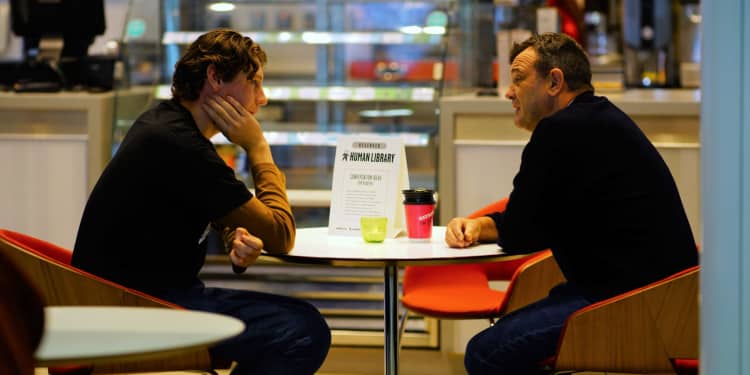A library where colliding worlds meet to listen to one another
Mon 15 Nov 2021
An improbable meeting of different people comes courtesy of the Human Library, a nonprofit learning platform that allows people to borrow people instead of books. But not just any people. Every “human book” from this library represents a group that faces prejudice or stigmas because of their lifestyle, ethnicity, beliefs, or disability.
The Human Library stages in-person and online events where “difficult questions are expected, appreciated, and answered.” Organizers said they’re trying to encourage people to “unjudge” a book by its cover.
This setup leads to some of the most unlikely pairings anyone will ever see.
The Human Library was created 21 years ago by Ronni Abergel, a Danish human rights activist and journalist who became interested in non-violence activism after a friend he describes as a “troubled youth” survived a stabbing in Copenhagen.
Abergel was born and raised in Denmark but lived in the US as an exchange student and has seen the political climate become increasingly partisan.
He wondered if a human library could bring people together like a traditional one. Only in this one, unconventional people would be treated like books — readers could loan them out, ask them questions, learn something they didn’t know, and challenge their perceptions.
“I had a theory that it could work because the library is one of the few places in our community where everyone is welcome, whether you’re rich or poor, homeless or living in a castle, professor or illiterate. It’s truly the most inclusive institution in our time,” he said.
Abergel’s idea has spread like a bestseller. The Human Library has hosted events in more than 80 countries, in libraries, museums, festivals, and schools. It has more than 1,000 human books in circulation in more than 50 languages, with an especially strong presence in American cities such as Chicago and San Francisco, Abergel says.
If people check out a book, they won’t need a translator. A librarian makes sure to pair readers with someone whose language they can understand.
“If you speak English, we make sure not to put you in a room with French books,” Abergel said.
Abergel believes the library’s mission has taken on more urgency in recent years.
Abergel says there’s a need for people to have conversations with others who see the world differently — minus the verbal combat.
“People want to have safe spaces to connect and maybe diffuse some of the tension in the air,” he said.
Source: Agencies

 Apr 29 2024
Apr 29 2024












